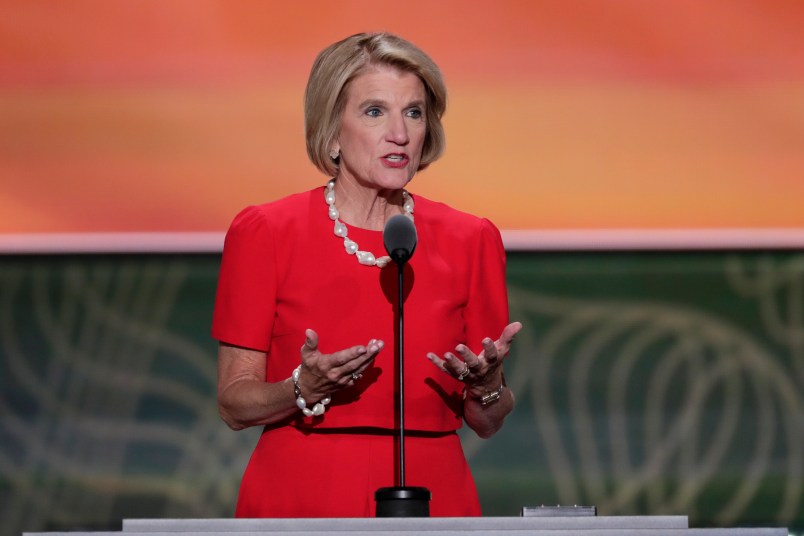As the GOP confronts the complexity of repealing Obamacare, Senate Republicans hailing from states that expanded their Medicaid programs under the Affordable Care Act are feeling an extra layer of pressure.
Altogether, there will likely be 20 Republican senators from Medicaid expansion states next term. Many come from so-called “Trump country,” the industrial and rust belt states like Pennsylvania and Ohio that were critical to Trump’s win. Working class whites in general have been among the top beneficiaries of Medicaid expansion.
“I’m from a state that has an expanded Medicaid population that I am very concerned about,” said Sen. Shelley Moore Capito (R-WV) this week. “I don’t want to throw them off into the cold, and I don’t think that’s a strategy that I want to see. It’s too many people. That’s over 200,000 people in my state. So we need a transition. I think we’ll repeal and then we’ll work during the transition period for the replacement vehicle.”
“A number of us have been talking about that you want to make sure that any repairing and fixing — because it clearly needs repairing and fixing — that we do now takes into account the current situation with different states that have taken different actions. Indiana’s expansion was different from ours, was different from Ohio’s. … It’s a topic that a lot of us were focused on it,” said Sen. Dan Sullivan (R-AK).
Only two of the Republican senators from expansion states will be up for reelection in 2018.
The expanded Medicaid program in the Affordable Care Act raised the eligibility level for low income adults earning up to 138 percent of the federal poverty line. The idea was that the expansion would cover the gap between low income adults enrolled in the traditional Medicaid program and those consumers who can afford subsidized insurance on the Obamacare exchanges.
The program is set up so that the federal government covers 100 percent of the expansion for the first three years, and then 90 percent beyond that. Some Republicans argue that states shouldn’t be expected to pick up that portion of the bill and the program was challenged in the Supreme Court, where a conservative majority ruled that states could have the choice whether to expand Medicare.
Many GOP lawmakers are leaning towards an Obamacare repeal plan that would give them a sunset period during which to cobble together a replacement. Health policy experts warn that this approach can still cause chaos in the near-term.
Republicans about a year ago passed a bill to repeal parts of Obamacare that many GOP lawmakers have said will be the model of their repeal effort early next year. That version — which was ultimately vetoed by President Obama –delayed the repeal of Medicaid expansion by two years, and the legislation being considered now may delay it by three, according to some members.
“Last time, it was a two-year transition period, so people who are currently covered by Medicaid because of the Affordable Care would know that the rug is not going to be pulled out from under them,” Sen. Rob Portman (R-OH) told TPM this week. “John Kasich, our Republican governor, who was for having expanded Medicaid, liked that because it gives him a chance to weigh in on the kind of Medicaid that he would like to see, which would be to give the state much more flexibility.”
Portman added that “the idea is to not end the expansion, but to give the states the tools to be able to cover more people more effectively.”
Such an approach may not be as simple as Portman makes it sound considering that Democrats are already balking at the idea that they would help Republicans replace Obamacare, which will likely require 60 votes, by the time the repeal goes into effect in two or three years. And some Republicans have objected to the idea of Medicaid expansion altogether.
The disagreement over whether to maintain Medicaid expansion popped up in the debate over the 2015 repeal legislation, where the program was preserved in the House version. Under pressure from conservatives, the Senate added the delayed-repeal of the program.
Correction: A previous version of this story mistakenly described the Medicaid eligibility rate of the traditional program as being at 100 percent of the federal poverty line. Medicaid eligibility varied from state to state before the ACA, and continues to vary in non-expansion states. We regret the error.







Don’t back-down now Republican Senators, demand a repeal vote of Obama-care on the 1st day you’re back in session, next year!
Keep your word and send O-Care to the trash heap of history! That’s why we voted for you! All us uneducated deplorables have your back!
Shelley, sweetie, that’s a word salad worthy of the great Sarah Palin. Jibberish Grande.
Another word salad. Come on, you fuckers – get snapping! Your supporters voted you in so you could strip every Democratic law and program from the books. Rid us of the horrible, baby-killing, anti-heterosexual family, devil-worshiping, tree-hugging, non-pussy grabbing Social Security. The bigly terrible vaccine-forcing, boy-raping, fair-tax paying, socialistic, crooked, old-geezer saving Medicare. Come on, Republicans, do your god damned jobs: HATE!! KILL!! If you don’t, who will??
Seemingly moderate folks like Rob Portman are idiots if they think they are going to craft a workable replace when Trump names a zealot like Tom Price as head of HHS. Fellow zealots are increasingly in control of the House and it appears the Freedom Caucus, Heritage Foundation, Liberty Lobby and Jim DeMint have been working w Trump forces to assure agency staffing is dominated by their acolytes. Wise up Rob. It is repeal! Full stop!
Have fun dealing with the fallout, morons.